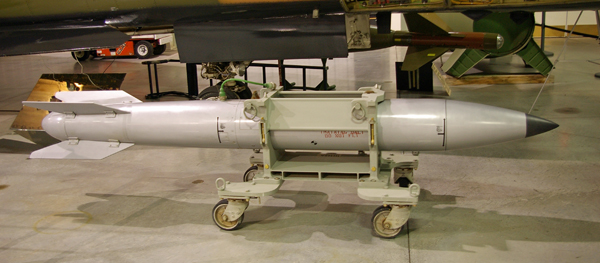Nuclear Weapons 701 - The U.S. Has Fifty Nuclear Bombs In Turkey - Part 1 of 2 Parts
B-61_bomb.jpg

Part 1 of 2 Parts
During the Cuban Missile Crisis between the U.S. and the Soviet Union, new U.S. nuclear missile batteries in Turkey became a point of contention in the bargaining to avoid an all-out nuclear war. Those missile batteries were removed in 1963 as a concession on the part of the U.S.
The U.S. and Turkey are both members of NATO. They are bound by treaty to defend the collective security of any and all twenty-eight members of NATO. Turkey is one of five NATO members which currently host U.S. nuclear weapons under a NATO nuclear sharing agreement in which the U.S. stations nuclear bombs in NATO countries which do not have their own nuclear arsenals. The other four NATO members with U.S. nuclear weapons include Belgium, the Netherlands, Germany and Italy.
The U.S. nuclear bombs in Turkey are referred to as B61s. They are gravity bombs intended to be dropped from airplanes. They are stationed at the Turkish Incirlik airbase which is about a hundred miles from the Turkish border. The B61 have a variable yield between three hundred kilotons and three hundred and forty kilotons. The Turkish air force used to have fighter-bombers which could deliver the B61s but they no longer have any planes which could drop the B61s. NATO and the U.S. have discussed the removal of the B61s from Incirlik for decades but they remain in Turkey. NATO members and Turkey in particular have lobbied against the removal of the B61s from Turkey because they are seen as a symbol of U.S. commitment.
The relationship between the U.S. and Turkey has been deteriorating since the aborted coup attempt in 2016. During the coup, one of the conspirators fled to Incirlik and sought refuge at the base which was refused. Since then, U.S. concerns about removing the B61 from Incirlik have risen and there has been much discussion about their fate.
Turkey is a signatory of the nuclear non-proliferation treaty which forbids them from acquiring nuclear weapons. However, recent comments from Turkey considering the question of the U.S. removal of the B61s indicate that President Erdogan believes that Turkey should have nuclear weapons and may seek to develop or buy them if the U.S. removes the B61s.
About a week ago, President Trump had a phone conversation with President Erdogan of Turkey. Following the call, President Trump announced that about fifty U.S. troops in northern Syria were being withdrawn. Turkey announced that it was going to clear a “safe zone” south of the Turkish-Syrian border and resettle several million refugees who fled to Turkey during the past few years of the Syrian civil war. The U.S. basically abandoned the Kurds in norther eastern Syria to fight off the Turkish incursion. The Kurds, abandoned by the U.S. have turned to Syria and Russia for help.
As the U.S. troops withdrew from the “safe zone”, they were deliberately targeted by the artillery of the advancing Turkish troops. The Pentagon issued a warning to Turkey that any further targeting of U.S. troops by Turkish forces would result in “immediate defensive action” from the U.S. troops. Such a potential deadly conflict between U.S. troops and Turkish troops is unprecedented in the NATO alliance.
Please read Part 2